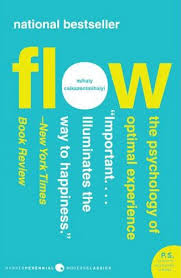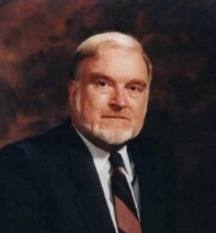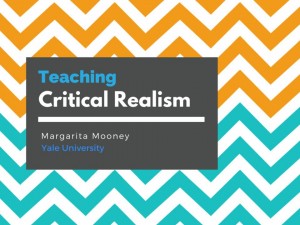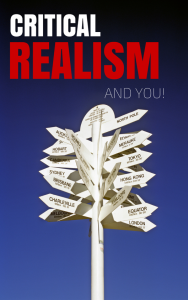Did you know that you can actually increase your ability to enjoy the things in life that produce the greatest satisfaction?
 When I read Martin Seligman’s PERMA concept of human flourishing (Positive Emotions, Engagement, Relationships, Meaning and Achievement) I simply presumed that Type-A, achievement oriented people like me are too busy doing our work to get into flow (another word for engagement). “Flow must be what creative types, like artists or actors, experience,” I naively thought. To learn more about flow, I recently perused one of the books from the reading list I developed for my positive sociology class, Flow: The Psychology of Optimal Experience, by Mihaly Czikszentmihaly. To my delight, I learned from Czikszentmihaly that the reason I can dedicate so many hours of solitary reading and writing is because learning new things is the primary way I experience flow.
When I read Martin Seligman’s PERMA concept of human flourishing (Positive Emotions, Engagement, Relationships, Meaning and Achievement) I simply presumed that Type-A, achievement oriented people like me are too busy doing our work to get into flow (another word for engagement). “Flow must be what creative types, like artists or actors, experience,” I naively thought. To learn more about flow, I recently perused one of the books from the reading list I developed for my positive sociology class, Flow: The Psychology of Optimal Experience, by Mihaly Czikszentmihaly. To my delight, I learned from Czikszentmihaly that the reason I can dedicate so many hours of solitary reading and writing is because learning new things is the primary way I experience flow.
What exactly is flow? According to Czikszentmihaly, flow is “joy, creativity, the process of total involvement with life” (Flow, p. xi). How do we achieve flow? By fighting against psychic entropy (or chaos in our thoughts) by striving for order in our consciouness. When we have order in consciousness, “the information that keeps coming into awareness is congruent with goals, psychic energy flows effortlessly” (Flow, p. 39).
As Czikszentmihaly describes in this TED lecture, he and his colleagues have interviewed thousands of people from business leaders, to Benedictine monks, to star athletes in order to understand what conditions lead to flow. But experiencing flow is by no means limited to extraordinary people or unusual circumstances, it’s something we can all attain if we understand what flow is and how to experience it.
Why is flow important to well-being? In modern societies, we have nearly unlimited choices and autonomy, which, as I’ve written about before on this blog, can paradoxically lead to boredom and wasted opportunities. To make the most of our freedom, Czikszentmihaly argues that we must learn to find purpose in our daily activities and how to experience enjoyment while doing those activities. Whereas I thought only certain activities like music or sports create flow, Czikszentmihaly points out that flow is not inherent to any particular activity; rather, we achieve flow as a result of our attitude towards that activity.
We need flow to be happy because a disordered, wandering mind is the opposite of a virtuous and happy life.
“When a person is able to organize his or her consciousness so as to experience flow as often as possible, the quality of life is inevitably going to improve…even the usually boring routines of work become purposeful and enjoyable…Flow helps to integrate the self because in that state of deep concentration consciousness is unusually well ordered… The self becomes more complex as a result of experiencing flow” (Flow, pp. 40-42).
One of my favorite saints, St. Ignatius of Loyola (who Czikszentmihaly discusses), taught about internal order of our consciousness through prayer and discipline. One place I most easily find flow is the Catholic Mass. The progression of the liturgy helps my wandering brain to get into flow, and in that flow, I experience internal order and peace. Every aspect of the sacred liturgy—my bodily motions, singing, vocal prayers, and receiving the Eucharist—does exactly what Czikszentmihaly says it should—focus my attention on something else and order all of my senses towards one goal–union with God through prayer.

I was relieved to be corrected in my mistake of thinking that my work is only about achievement. Part of the reason I have persevered in academia is that I experience flow in my work, which Czikszentmihaly says is crucial to a high quality of life. For academics, mastering a subject we are studying is not not unlike what others experience from climbing Mount Everest or surfing the Big Eddy—writing a dissertation, a book, or even a short (but awesome) blog is hard to do, but when it’s over, you feel like a champ.
Wait a minute, you might wonder, isn’t flow something we get through leisure? if you ask people what they want to expand their enjoyment in life, especially when it comes to something mushy like flow, they would probably say “more time off from work!”
More time off from work for leisure in theory could increase our flow, but Czikszentmihaly argues that “one of the most ironic paradoxes of our time is this great availability of leisure that somehow fails to be translated into enjoyment,” (Flow, p. 83). is also very clear that most of us use our leisure time very unwisely. Perhaps the worst thing with leisure time is to vegetate brainlessly in front of the TV or mindlessly read everyone’s Facebook posts. But Czikszentmihaly is also skeptical about only engaging in sports as a spectator rather than as a participant.
Why? Our leisure time, according to Czikszentmihaly, produces flow when we are a) challenged but also rewarded; b) feel like we have expanded our skills, our ability to experience new things. When was the last time when watching a TV show, a movie, or even watching the finals of some sporting event, made you think, “Gee, I just grew as a person!” The entertainment of TV and watching sports is appealing because it provides immediate sensory excitement and feedback, but does little to expand our ability for optimal experiences. The same goes for for casual sex, Czikszentmihaly says. Having sex with a relative stranger or watching pornography may indeed stimulate our sexual appetite and satisfy the momentary sexual urge, but only committed love of a whole person (which can encompass the sexual dimension) expands our capacity to love.
In other words, when it comes to pleasures, it’s not just “use it or lose it” it’s “expand it or waste it.” Czikszentmihaly’s concept of flow challenges us because simply using some capacity we have without trying to deepen the experience from that activity will lead to entropy—the gradual loss of our ability to enjoy that activity at all. Our approach to any leisurely pastime or pleasurable activity should be one of expanding our capacities for experiencing flow.
So, instead of watching movies, TV or sports, this week I’m increasing my flow in various ways. In my leisure time, I turned attention away from the TV and towards Scrabble—a game that requires creating words out of letters, learning the rules of the game board, and competing with another person. I also invited some friends over to eat pizza and for a friendly match of wiffle ball—a game that is easy to master (hence people of all abilities can flow while playing) but nonetheless requires coordination, competition, and a good sense of humor.
If you want to increase your well-being through flow, I have two suggestions. First, you must see your work—whether your do manual labor, intellectual labor or household labor—as a chance to expand your consciousness. (If you are barking at me saying your work doesn’t allow for flow, please read Czikszentmihaly’s chapter on the factory worker who experiences flow. It’s not your professional work or your vocation to homemaking that is getting in the way of your flow—he says it is your attitude towards your daily work). Second, you should pay careful attention to how you use your leisure time. Don’t unwittingly dampen your consciousness by watching mindless TV shows or talking about your neighbors, but expand your ability to enjoy things like theater, music, sports, and liturgy. You may even want to pick up a great book like Flow and discuss it with your friends and family.












